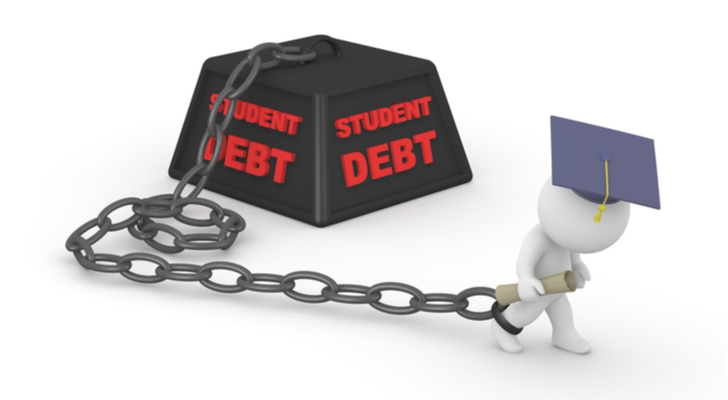If you have student loan debt hanging over your head, it doesn’t matter how responsible you are with your money; a debt that large makes it difficult to manage your personal finances. And it isn’t going to disappear overnight.
When you have high student loan debt, every financial decision you make carries the pressure of your student loan. Even a well-earned reward — like your first vacation in ten years — can leave you feeling guilty for spending money.
Student loan debt can feel so insurmountable that many people are waiting for laws to change before tackling their loans. They hold out hope that they’ll qualify for some sort of forgiveness program.
The internet is full of rumors about student loan forgiveness programs, but don’t be quick to buy into the hype. Many companies that claim to be able to lower your debt have been exposed as scams. The Department of Education reminds you that you don’t have to pay for loan advice, consolidation or to switch repayment plans.
You could wait for a student loan forgiveness program you qualify for to be created, but what if that never happens? The truth is, procrastinating will only help you collect more interest.
Paying Your Student Loan Debt May or May Not Get Easier in 2019
Secretary of the Department of Education, Betsy DeVos, plans to launch a new FSA student loan program for 2019.
The changes are intended to better service outstanding loans by centralizing the efforts of nine companies into one cohesive system. This plan changes how the government services outstanding Federal student loans and makes it easier for borrowers to make payments.
Not everyone believes the changes will be beneficial, however. Having only one loan servicer cuts out all competition, and in a country where 44 million people have student loan debt, expecting one company to handle all of it may backfire.
That’s why you shouldn’t wait until 2019 to start paying off your student loans. The current system is flawed and confusing, but there’s no guarantee 2019 will bring a different experience.
Americans Owe $1.31 Trillion In Student Loan Debt
When you took out your student loans, you and 44 million others were promised that an education was the route to a high-paying job and that you’d have no problem paying the loans back in a few years.
But that promise has yet to be fulfilled.
The jobs don’t exist. Or, when they do exist, the salary is lower than expected.
Up to 33% of college graduates were underemployed. When you look at recent college graduates (who have the highest student debt due to
skyrocketing education costs), that number jumps to 44%.
The numbers are daunting, but waiting for policies to change won’t resolve your personal student loan debt. Assessing your options and taking action is the only way you’ll pay it off.
Don’t wait for policies to change — take action today.
Alternative Options For Paying Off Student Loan Debt
When they find themselves unable to make unable to make monthly payments, borrowers often incorrectly think that they are stuck with traditional options like consolidation and taking out another loan.
But this is far from true.
Check with your loan servicer and the Department of Education. You may be eligible for an income-driven repayment plan or even loan forgiveness (usually for working in certain jobs).
If you own a home, you could use your home equity line of credit (HELOC) to pay off your student loan. HELOCs are “revolving” debt. Based on the amount of equity in your home, the lender will determine your maximum credit limit. Then, you can typically borrow during a multi-year window known as the “draw period” before shifting to the “repayment period.”
Some Precautions About Using Home Equity
It’s important to understand that using home equity (or any credit line) to pay off student loan debt isn’t actually getting rid the debt, but rather shuffling the debt around. Instead of paying off student loan debt, you’ll be paying off home equity debt. Sometimes this makes sense if you can get a better interest rate, but consider the following:
- Your student loan is an unsecured debt. There is no collateral. If you default, your tax refunds and wages can be garnished but they can’t go after your home.
- A home equity loan is secured debt. Your home is collateral. If you default, your home could go into foreclosure and you may need to sell it for less than it’s worth.
- Moving an unsecured debt to a secured debt is risky.
- Moving your student loan to a home equity loan means you won’t qualify for the legitimate student loan forgiveness programs. You won’t be able to receive any help from Federal programs to pay it off.
Choose Your Repayment Method Wisely
Everyone’s situation is different, and there is no perfect solution for everyone.
Regardless of how you choose to repay your student loan debt, the most important thing you can do is stop procrastinating and start paying it off now.
Remember that shuffling debt around to get a better interest rate or monthly payment is only part of the equation. Next, you’ve got to actually start making payments.

